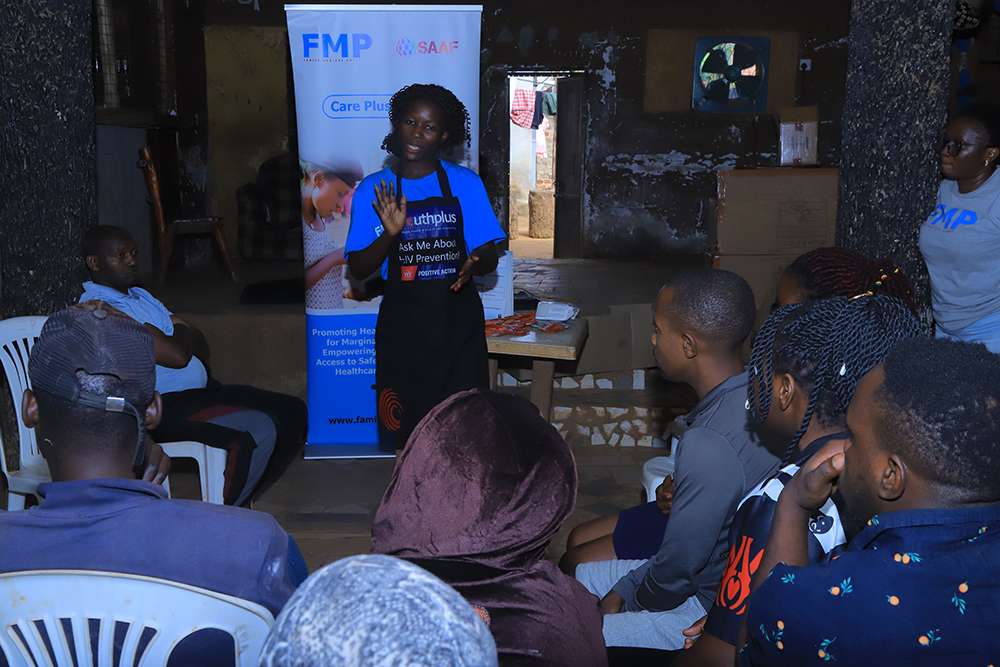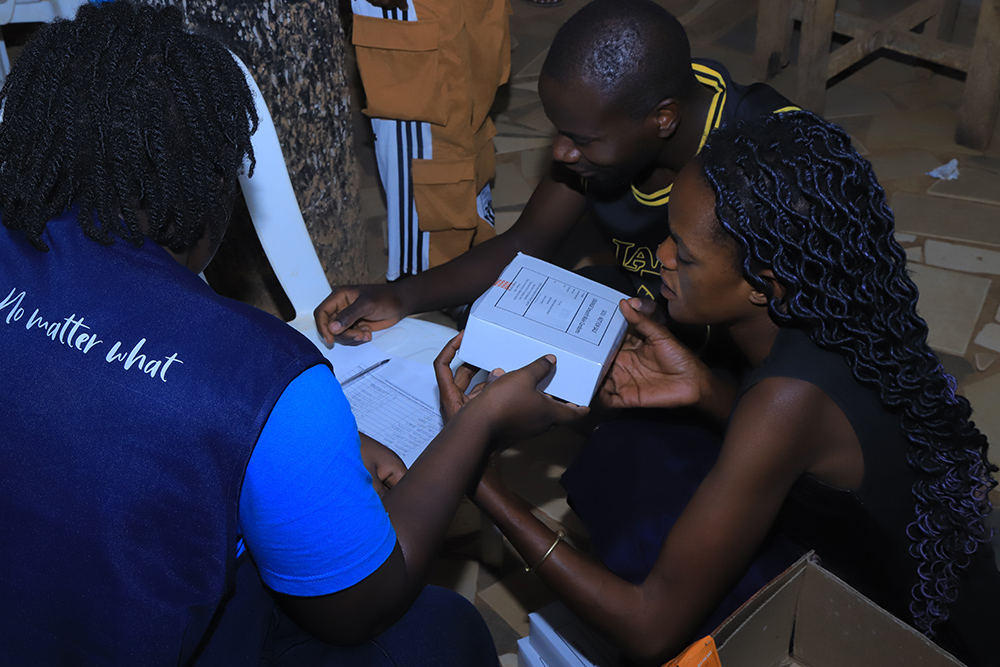Condom shortage fuels HIV crisis in Nakiwogo fishing community
This stark reality was witnessed by a team from Family Medical Point (FMP), a sexual and reproductive health civil society organisation, who visited the community on 23 July 2025 to conduct a sexual health camp dubbed “Musawo Session”.
Polyne Nabwire, the head of programs at Family Medical Point, talking to the locals including sex workers of Nakiwogo fishing community in Entebbe Municipality during their health camp. (Credit: FMP)
__________________
In Nakiwogo, a fishing community located in Entebbe Municipality on the shores of Lake Victoria, the harsh reality of high HIV prevalence remains unabated. Known for its fishing activity, transient passengers, and round-the-clock hustle, the area faces increasing health challenges.
Amid a growing number of sex workers and a surge in transactional sex, there is an acute shortage of condoms.
This stark reality was witnessed by a team from Family Medical Point (FMP), a sexual and reproductive health civil society organisation, who visited the community on 23 July 2025 to conduct a sexual health camp dubbed “Musawo Session”.
They engaged with sex workers and other community members on issues including HIV prevention. During the session, several sex workers voiced their concerns and pleaded for assistance.
A Family Medical Point health worker talking to the locals of Nakiwogo fishing community in Entebbe Municipality during their health camp. (Credit: FMP)
Apio (not her real name), a 36-year-old sex worker and mother of three living with HIV, said that beyond the high cost of living, they cannot afford condoms for protection.
“One strip of condoms goes for shillings 1000, and a full box goes for sh20,000. Sometimes, I’m broke, and the only thing to do is reuse condoms. What choice do I have?” she said with a heavy voice.
“Her story is not unique. It’s one that has been reechoed by sex workers in the fishing communities of Kigungu, Kasenyi, Guuda, Nakiwogo, Kasensero, and other landing sites along Lake Victoria,” said Polyne Nabwire, head of programmes at Family Medical Point.
HIV prevalence in fishing communities along Lake Victoria has consistently been reported between 22% and 29%, nearly three to four times the national average.
According to a study published in the Journal of the International AIDS Society (2020), these high rates reflect the unique vulnerabilities in these areas, including limited access to healthcare, high mobility, and widespread transactional sex.
Condom shortage
The condom shortage in Nakiwogo has been blamed by the community for the rise in HIV infections.
According to Moses Odongo, executive director of FMP, condom distribution in these areas remains insufficient, and outreach programmes, often donor-funded, are irregular.
“Local health centres run out quickly. And stigma, especially around sex work, further prevents people, particularly women, from accessing what little protection is available,” he said.
Odongo also noted that the situation has been worsened by cuts in donor funding for CSOs providing sexual and reproductive health services.
“Donor fund cuts have resulted in fewer condoms, fewer outreach activities, and more lives left at risk. This is more than a supply issue. It is a public health emergency quietly eating away at Uganda’s fight against HIV and other sexually transmitted infections,” Odongo expressed with disappointment.
At the health camp, the FMP team brought with them 9,000 condoms, pink in colour and labelled “Government of Uganda”. However, they said this was not enough to address the scarcity.
They called on the government to intervene and ensure a steady supply of condoms in Nakiwogo and other fishing communities.
According to Nabwire, they always carry condoms during outreach events to distribute to sex workers and other community members.

Nakiwogo community members registering in a book after each receiving a box of Government of Uganda condoms. (Credit: FMP)
However, they have learned that when other organisations supply brothels and lodges with free condoms, these places often end up selling them. Each pair is sold at sh1000.
“There are times I can’t even afford a kikomando of sh1500, and yet I still have to work. If I can’t buy myself a simple meal, how will I afford condoms at sh1000 daily?” said Shasha, not her real name, a sex worker.
"The government has made strides in HIV prevention nationally, but clearly, not all communities are being reached. We need more than slogans and occasional handouts in these fishing communities. We need sustained interventions designed for these areas," stated Nabwire.
“We cannot continue to moralise public health. The health of a sex worker in a fishing community matters just as much as that of a banker in Kampala. The dignity of a fisherman should not be measured by how far they are from the capital. Let’s empower people with information, with access, with choices. Let’s invest in consistent condom supply chains, support peer-led health initiatives, and normalise conversations around sexuality and protection.”
Musawo session
The FMP Musawo Session attracted over 112 sex workers, who were provided with information and services related to sexual and reproductive health (SRHR). The Musawo Session is a model developed by FMP to create a safe and supportive environment for women and girls to share their experiences, access accurate health information, and receive care. The session focused on topics such as HIV prevention, mental health, and family planning.
During this event, a total of 52 sex workers were tested for HIV, while 94 received other SRHR and family planning services.